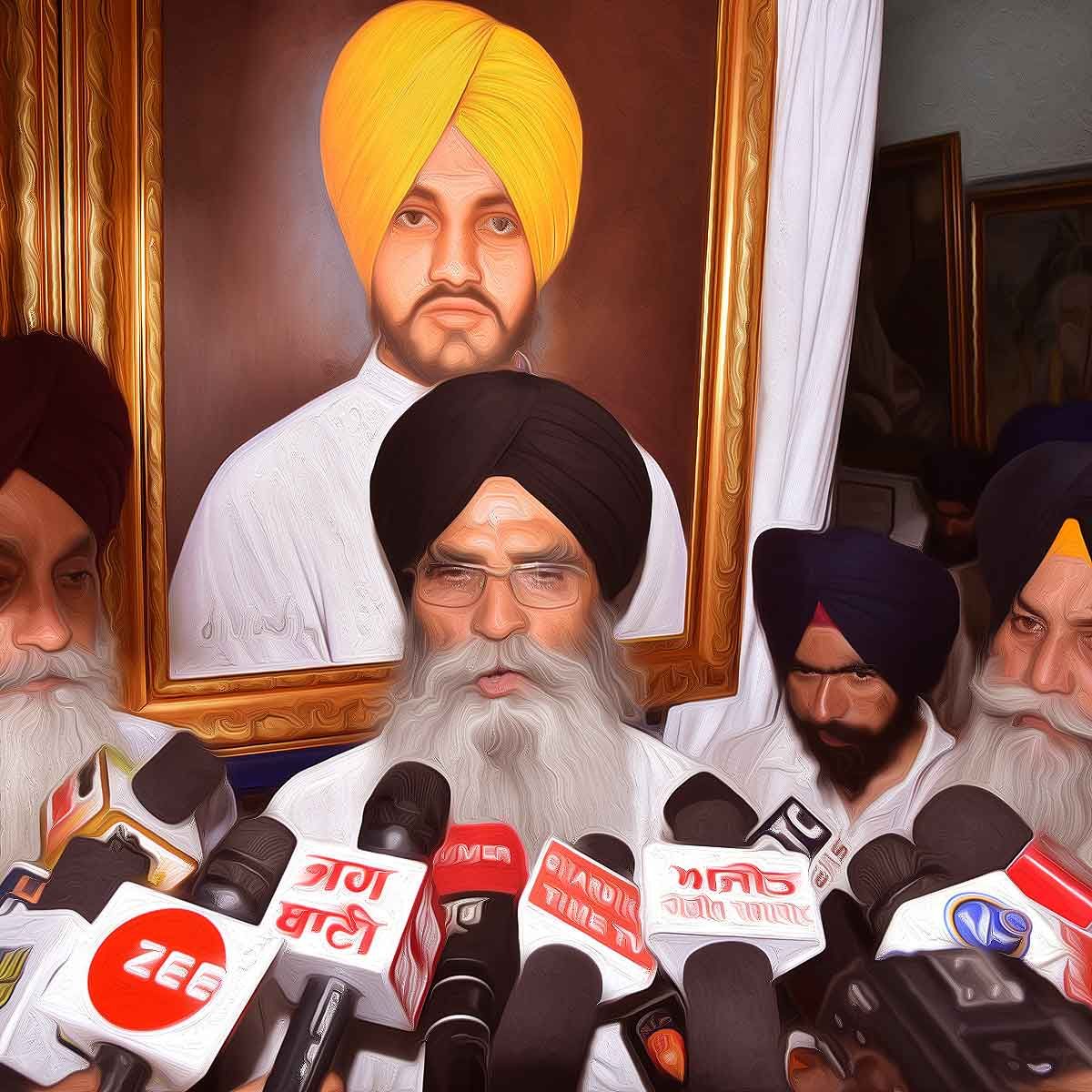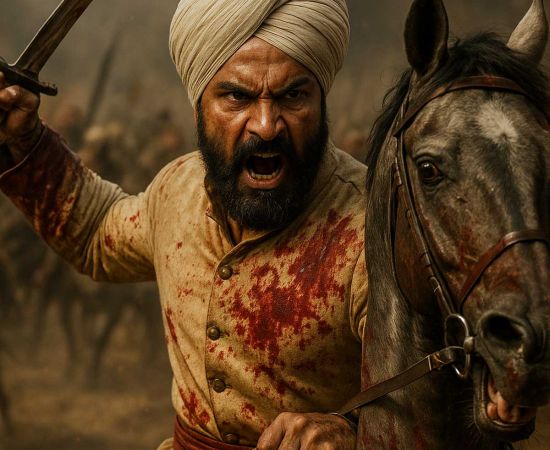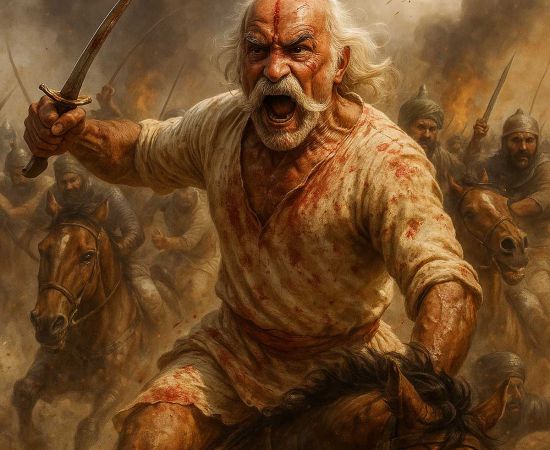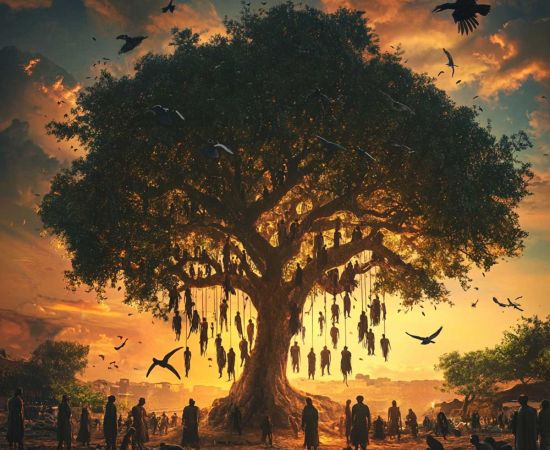MORE COVERAGE
Twitter Coverage
Satyaagrah
Written on
Satyaagrah
Written on
Satyaagrah
Written on
Satyaagrah
Written on
Satyaagrah
Written on
JOIN SATYAAGRAH SOCIAL MEDIA
"Shaheed Bhai Dilawar Singh had put an end to atrocities and gross human rights violations committed against Sikhs": SGPC installs portrait of Former CM Beant Singh’s assassin at Central Sikh Museum inside Golden Temple complex and what it means

On June 14, Shiromani Gurudwara Prabandhak Committee (SGPC) installed a portrait of Dilawar Singh, the assassin of former Chief Minister of Punjab Beant Singh, at the Central Sikh Museum that is located inside Harmandir Sahib Complex.
SGPC president Advocate S Harjinder Singh, a family of Dilawar Singh, and other office bearers were present at the ceremony.
|
Speaking at the ceremony, SGPC President praised Dilawar Singh and said, “Shaheed Bhai Dilawar Singh had put an end to the atrocities and gross human rights violations committed against the Sikhs then. The decision of sacrificing self is not possible without the Guru’s blessing, and whenever atrocities were committed on the Qaum (community/nation), Sikhs have always made history by making sacrifices.”
In a tweet, SGPC said, “He took birth at the house of his father S Harnek Singh and mother, Surjit Kaur at maternal village Panjgrain in Faridkot. After education, he joined Punjab Police, and for his sacrifice, he was recognized with the title of ‘Qaumi Shaheed’ by Sri Akal Takht Sahib.”
|
SGPC’s move came when co-accused of Beant Singh’s murder, Balwant Singh Rajona’s sister Kamaldeep Kaur is contesting Lok Sabha by-poll on a Shiromani Akali Dal (SAD)-Bahujan Samaj Party (BSP) ticket from Sangrur. The Sangrur Lok Sabha seat fell vacant after Bhagwant Mann resigned from there, having won the Dhuri assembly constituency in this year’s Punjab assembly elections. Kaur met her brother in the Patiala Central Jail before her name was announced as the candidate.
Who was Dilawar Singh?
Dilawar Singh Babbar, aka Dilawar Singh Jaisinghvala, was born on August 18, 1970, at village Panjgrain in district Faridkot, Punjab. His father’s name was Sardar Harnek Singh, who was a government employee. His mother’s name was Surjit Kaur. Dilawar Singh joined Punjab Police after completing his studies. During the insurgency, the Congress-led Punjab Government and Central government were accused of atrocities against Sikhs in Punjab.
While serving for Punjab Police, Dilawar joined Khalistani terrorist organization Babbar Khalsa and conspired with another member of Babbar Khalsa, Balwant Singh Rajoana, to kill then-Chief Minister of Punjab, Beant Singh. Rajoana was also a serving Punjab Police officer. Dilawar reportedly volunteered to become a suicide bomber to kill CM Singh.
On August 31, 1995, at around 5 PM, Dilawar Singh blew up the bullet-proof car of Beant Singh at Punjab and Haryana Civil Secretariat Chandigarh. Along with CM Singh, Dilawar Singh and 17 others were killed in the blast. Two years later, on December 25, 1997, Rajoana confessed his involvement in the case, and while doing so, he blamed Punjab and the Central government for atrocities against Sikhs in Punjab. Rajoana was given the death sentence for his involvement in the assassination of CM Singh.
Dilawar Singh’s death anniversary is celebrated by his followers every year in India and abroad. On March 23, 2012, he was awarded the title of ‘National Martyr’ by Akal Takht. It is the highest award or the temporal seat of the Khalsa. His parents were honoured by The Khalsa Action Committee with the Shaheed Baba Deep Singh gold medal at a function in the city of Amritsar, and Dilawar Singh was awarded the title ‘pride of the nation’.
The politics around portraits of Sikh terrorists at the Museum
Dilawar Singh is not the first Khalistani Sikh terrorist whose portrait is on display in the Museum at the Golden Temple. Portraits of Khalistani terrorists who were killed in Operation Blue Star, including Jarnail Singh Bhindranwale, Amrik Singh, and General Shabeg Singh, along with Sukhdev Singh Sukha and Harjinder Singh Jinda, who assassinated General AS Vaidya, were installed by SGPC over the years.
 Google map view of Central Sikh Museum at Golden Temple showing a portrait of Jarnail Singh Bhindranwale. Source: Google Maps/SGPC |
The radical Sikh groups have been demanding the installation of Dilawar’s portrait in the Museum. Akal Takht, that celebrates his death anniversary every year also demanded the same. The recent step is being seen in the line of SAD’s announcement of fielding Rajoana’s sister Kamaldeep Kaur from the Sangrur Lok Sabha bypoll that is scheduled for June 23. Reports suggest the SAD-BSP alliance would seek a vote in support of the immediate release of Sikh prisoners, including Rajoana and Jagtar Singh Hawara, another convict in the assassination case.
Could the absence of Sahajdhari Sikhs from SGPC be helping radicals?
Several netizens have pointed out that barring Sahajdhari Sikhs from voting in SGPC elections could have helped radicals to overtake the decision process of installing such portraits in the Museum. Columnist Divya Kumar Soti said on Twitter, “Result of excluding Sahajdhari Sikhs from SGPC,” while quoting a report of the installation of Dilawar’s poster in the Museum.
|
Speaking to OpIndia, Paramjeet Singh Ranu, National President, Sehajdhari Sikh Party, said, “When a political party is formed, we take oath at Election Commission that we will not participate or support in any anti-national activity. Killing a sitting CM is an anti-national act. Sahajdhari Sikhs Party will never support promoting such elements who had participated in anti-national activities. SGPC is a religious body. They should stay away from such activities that may cause instability in the already tense situation in Punjab because of radicals and Khalistanis.”
Contrary to these two statements, several netizens pointed in comments to Soti’s post that if Sahajdharis were in a position to install Dilawar’s poster, they would have done it in 1995 itself.
|
Who are Sahajdhari Sikhs?
In simple words, a Sahajdhari Sikh is a person who follows the path of Sikhism but has not yet become Amritdhari. A Sahajdhari does not wear the Five Symbols of Sikhism, also known as the Five Ks, which are Kesh (uncut hair), Kara (a steel bracelet), Kanga (a wooden comb), Kaccha (cotton underwear), and Kirpan (steel sword). Many Sahajdhari Sikhs cut their hair and/or trim their beard. However, they would not touch tobacco and strictly avoid eating Halal meat.
Sehajdhari Sikhs were barred from voting in SGPC elections by amending Gurdwara Act, 1925 in 2016. Sehajdhari Sikhs, since the amendment, have been fighting for their right to vote in SGPC elections.
References:
opindia.com
 Support Us
Support Us
Satyagraha was born from the heart of our land, with an undying aim to unveil the true essence of Bharat. It seeks to illuminate the hidden tales of our valiant freedom fighters and the rich chronicles that haven't yet sung their complete melody in the mainstream.
While platforms like NDTV and 'The Wire' effortlessly garner funds under the banner of safeguarding democracy, we at Satyagraha walk a different path. Our strength and resonance come from you. In this journey to weave a stronger Bharat, every little contribution amplifies our voice. Let's come together, contribute as you can, and champion the true spirit of our nation.
 |  |  |
| ICICI Bank of Satyaagrah | Razorpay Bank of Satyaagrah | PayPal Bank of Satyaagrah - For International Payments |
If all above doesn't work, then try the LINK below:
Please share the article on other platforms
DISCLAIMER: The author is solely responsible for the views expressed in this article. The author carries the responsibility for citing and/or licensing of images utilized within the text. The website also frequently uses non-commercial images for representational purposes only in line with the article. We are not responsible for the authenticity of such images. If some images have a copyright issue, we request the person/entity to contact us at This email address is being protected from spambots. You need JavaScript enabled to view it. and we will take the necessary actions to resolve the issue.
Related Articles
- Call raised for a Patiala Bandh by Hindu Groups after armed Khalistani mob attacked a Kali temple and ran amok in the city brandishing swords: FIR registered against Khalistanis
- After two lynching cases in Punjab over sacrilege charges many theories sprouted like Political conspiracy, ISI-Khalistan, caste clashes and others
- Slogans of ‘Khalistan Zindabad’ painted on walls near Shaktipeeth Shri Devi Talab Mandir and an educational institution in Jalandhar, Banned terrorist organization Sikhs For Justice took responsibility through audio released by Gurpatwant Singh Pannu
- "चोर चोर मौसेरे भाई": Amritpal Singh's Lok Sabha win paves the way for his jailed accomplices to contest in Punjab's Assembly by-elections, spotlighting a peculiar political scenario where inmates are swapping prison cells for legislative chambers
- "जो बोले सो निहाल": India marks a significant security success as Rattandeep Singh, a high-profile militant linked to numerous bomb blasts and the Khalistan Commando Force, is shot dead by unidentified gunmen, neutralizing a major national security threat
- Gujaratis are agitated and are taking PM Modi’s security breach in Congress-ruled Punjab personally: In their hearts, Modi is still ‘their man’
- "We will see where their Kali Mata will go to hide and who forced your Durga to dance naked” the Nihang Sikh insulted and threatened Hindus with violence after Khalistanis unleashed violence in Patiala
- “It is the privilege of those who fear love to murder those who do not fear it!": Amritsar: Shiv Sena leader Sudhir Suri shot dead outside temple amid protests over broken idols of Hindu Gods found in the garbage dump, Justice league India claimed attack
- Barjinder Singh Parwana instigated Sikhs for Patiala violence against the ‘Khalistan Murdabad March’: Urged armed Sikhs to gather from all over Punjab, famous Maa Kali Mandir was attacked by Nihang Sikhs
- “Kashmiri freedom fighters, leave valley – reach Delhi to sabotage Republic Day, it's now or never for Khalistan" - Gurpatwant Singh Pannu of the Khalistani terrorist organization SFJ has called out the anti-India separatists and terrorists
- How Republic day 2021 succumbed to violence and desecration of Indian tricolor at the Red Fort created shock waves across the country: Khalistanis gave a call to pick up arms on social media apps
- "Khalistani ideology is mainly a catalogue of blunders": Punjab Police recovered incriminating material including holograms of Anandpur Khalsa Fauj, a firing range built by Amritpal Singh, and weapon training videos from Tejinder Singh alias Gorkha Baba
- Why Hindu-Sikh genocide of Mirpur in 1947 ignored? Why inhuman crimes of Radical Islamists always hidden in India?
- Amandeep Singh 'Inkquisitive', behind the distorted map shared by singer Shubh, claims victimhood and blames industry powerheads; while noting a Punjab blackout, he sidesteps questions about missing Jammu & Kashmir and seven northeastern states
- "Terror Tunes in Punjab": Delhi Police foil terror plot, arresting sharpshooters linked to Khalistani gangster Arshdeep Dalla, unveiling a shocking scheme to target Punjabi singer Elly Mangat and other VVIPs, exposing a grave threat to public safety



























